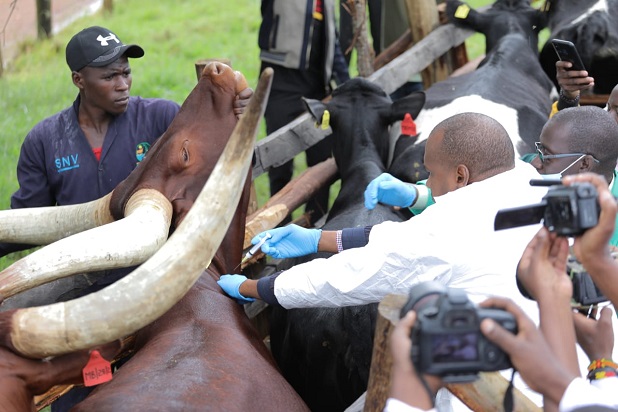Minister for Agriculture, Frank Tumwebaze administers the first anti-tick vaccine for field trials at MBAZARDI
Uganda has officially launched the final field trials for the Anti-Tick Vaccine developed by scientists at the National Agricultural Research Organisation (NARO).
The event took place at NARO’s Mbarara Zonal Agricultural Research and Development Institute (MBAZARDI) in Mbarara.
The Minister for Agriculture, Frank Tumwebaze, who was the Chief Guest, said the scientists have put the vaccine’s efficacy so far at 88%.
“The trials will be done in all ecological zones of the country,” Tumwebaze said, describing the event as a great day for the farming fraternity.
He also thanked fellow ministers, MPs, Mbarara City leaders, Local district and NRM leaders for coming to honor the work of scientists and for asking all the questions they wanted answered by the scientists on behalf of their constituent farmers.
“The success of the Anti-Tick Vaccine will also position Uganda among model countries in the fight against ticks which according to the UNFAO impact about 80 percent of the world’s cattle population,” Tumwebaze said, adding that if this works out as the scientists have assured him, Uganda will have registered a major breakthrough in animal disease control and livestock development generally.
NARO says it has produced a total of 3,000 doses of the candidate vaccines ready for these trials that will be carried out in Masindi, Ibanda, Apac and Nabilatuk districts.

Speaking at the same event, David Kasura-Kyomukama, the Permanent Secretary at Ministry of Agriculture, said: “We are convinced that, if successful, the Anti-Tick Vaccine will save our farmers millions of shillings lost in controlling ticks and loss of animals to Tick-borne diseases.”
Dr. Yona Baguma, the NARO Deputy Director General Research Coordination, said the candidate anti-tick vaccines were developed by extraction and isolation of conserved ticks proteins from local ticks collected from the 10 agro ecological zones of Uganda.
The development of the Anti-Tick Vaccine through NARO is one of the steps taken to control parasites in the Animal sub-sector.
Ticks are responsible for the spread of a number of diseases including Lyme disease, babesiosis, ehrlichiosis, Rocky Mountain Spotted Fever, anaplasmosis, Southern Tick-Associated Rash Illness, Tick-Borne Relapsing Fever, and tularemia.






